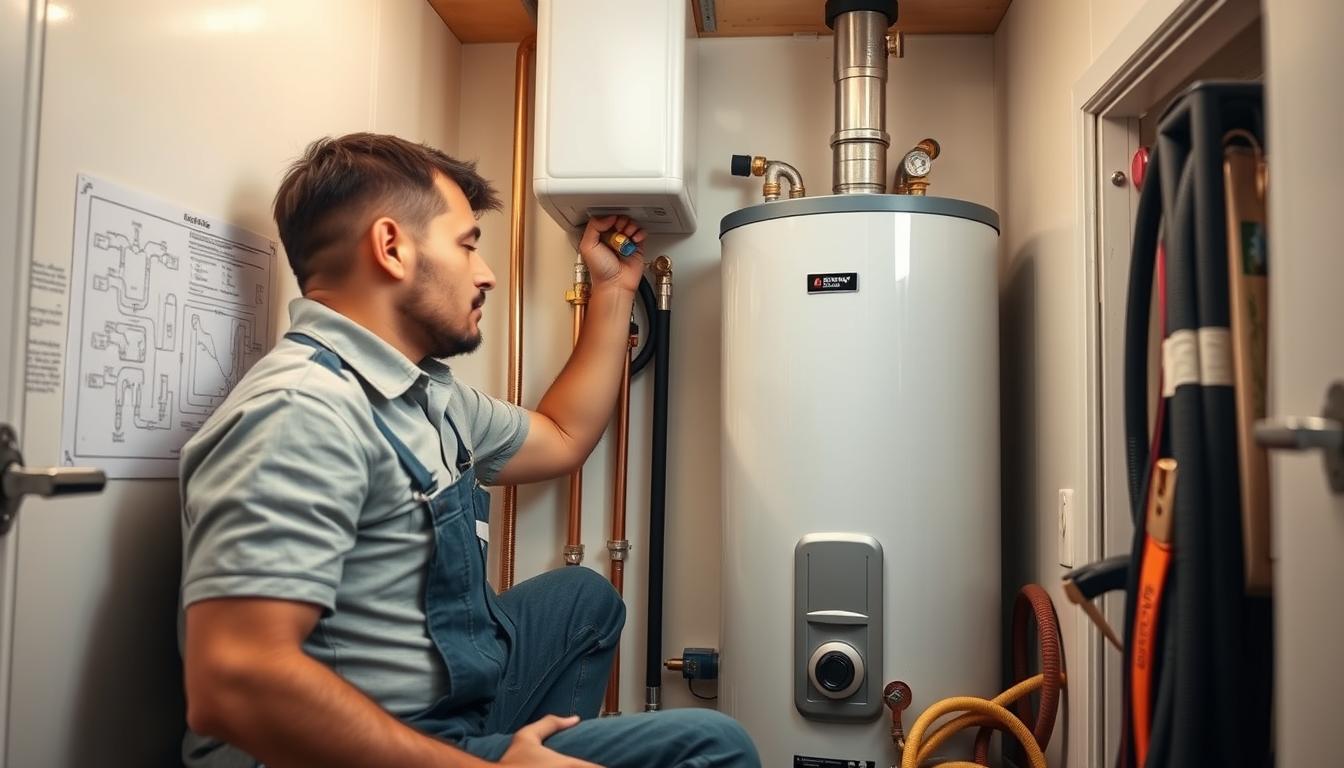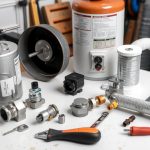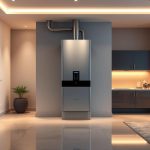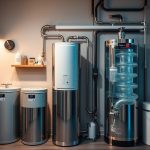When I first moved into my mobile home, I quickly saw how important a good water heater is. It’s key for comfort and daily life. As someone who’s dealt with mobile home appliances, I know how hard it is to pick the right water heater.
Choosing the right mobile home hot water heater is more than just buying an appliance. It’s about getting hot water when you need it, saving energy, and having a reliable system. This guide will help you through every important step, whether you’re replacing an old one or setting up a new one.
Mobile home water heaters are different from regular ones. They need special designs because of their unique space and building codes. Knowing this can save you a lot of money on installation mistakes and future repairs.
Key Takeaways
- Mobile homes require specialized water heater designs
- Energy efficiency is key for saving money over time
- Getting a pro to install it ensures safety and follows rules
- Think about the special space needs of manufactured homes
- Regular upkeep can make your water heater last longer
Understanding Mobile Home Hot Water Heaters

Choosing the right hot water heater for a mobile home is important. These systems are different from regular home heaters. They need special features to fit mobile homes well.
Mobile home heaters must follow HUD rules for safety and comfort. The right heater can save space and energy while keeping water hot.
Types of Hot Water Heaters for Mobile Homes
Mobile home owners have several heater options:
- Tankless water heater: Provides hot water when needed, saving up to 34% energy
- Propane water heater: Good for homes with gas lines
- Electric water heater: Easy to install and common in mobile homes
Key Features to Look For
When picking a water heater, look for these key features:
- Energy Efficiency Ratings: High ratings mean lower bills
- Compact Design: Important for saving space in mobile homes
- HUD Approval: Makes sure it meets housing standards
- Temperature Control: Allows for setting the water temperature
*Tip: Tankless water heaters can last up to 20 years, compared to 10-15 years for traditional storage tank models.*
Installation costs vary from $200 to $1,200. This depends on the fuel type and local prices. Gas tankless heaters cost between $1,000 and $1,500. Electric ones range from $500 to $1,500.
Benefits of Installing a Mobile Home Hot Water Heater
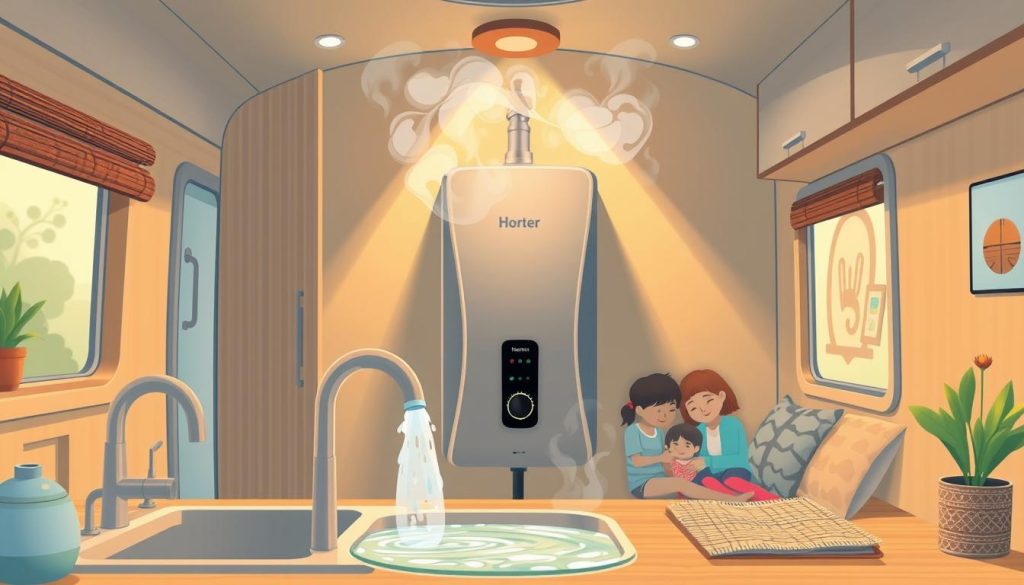
Choosing the right water heater for your mobile home can change your life. Today’s water heaters do more than just heat water. They help save money and use space wisely.
Energy Efficiency Advantages
Modern plumbing in mobile homes now includes top-notch water heaters. These heaters are designed to save energy. They come with features that cut down on your utility bills.
- Tankless models save up to 34% on energy consumption
- Direct vent water heaters optimize heating efficiency
- Energy Star rated units qualify for possible rebates
Space-Saving Designs
Mobile homes need smart use of space. That’s why compact water heaters are key. They fit well in small areas.
| Water Heater Type | Space Required | Installation Flexibility |
|---|---|---|
| Tankless Models | Minimal | Wall-mounted options |
| Direct Vent Heaters | Compact | Exterior venting |
| Point-of-Use Units | Extremely Small | Localized heating |
“Efficiency and compact design are no longer luxuries but necessities in modern mobile home water heating solutions.”
Getting an energy-efficient water heater is a smart move. It saves you money, uses space well, and makes your home more comfortable.
Common Issues with Mobile Home Hot Water Heaters

Mobile home water heaters face unique challenges that can affect their performance and lifespan. Owners of RV and trailer water heaters often deal with specific problems. These issues need careful attention and regular maintenance.
Knowing the common problems with your trailer water heater can help avoid expensive repairs. It can also make the unit last longer. Here are the main issues mobile home owners should be aware of:
Inadequate Hot Water Supply
Mobile home water heaters often have trouble providing enough hot water. Several factors contribute to this problem:
- Sediment buildup reduces heating efficiency
- Units that are too small for household needs
- Worn-out heating elements
- Incorrect thermostat settings
Leaks and Corrosion Challenges
Corrosion is a big threat to RV water heaters. Mobile home water systems are at risk because of:
- Special plumbing setups
- Harsh environmental conditions
- Poor water quality
“Water heater maintenance is not just about fixing problems, but preventing them before they start.”
To help mobile home owners understand common water heater issues, here’s a detailed list:
| Issue Type | Potential Causes | Recommended Action |
|---|---|---|
| Inadequate Heating | Sediment buildup | Annual tank flushing |
| Leaks | Corroded tank or connections | Professional inspection |
| Inconsistent Temperature | Faulty thermostat | Thermostat replacement |
Proactive maintenance and regular inspections can greatly reduce the chance of serious water heater problems in mobile homes.
Choosing the Right Capacity for Your Needs
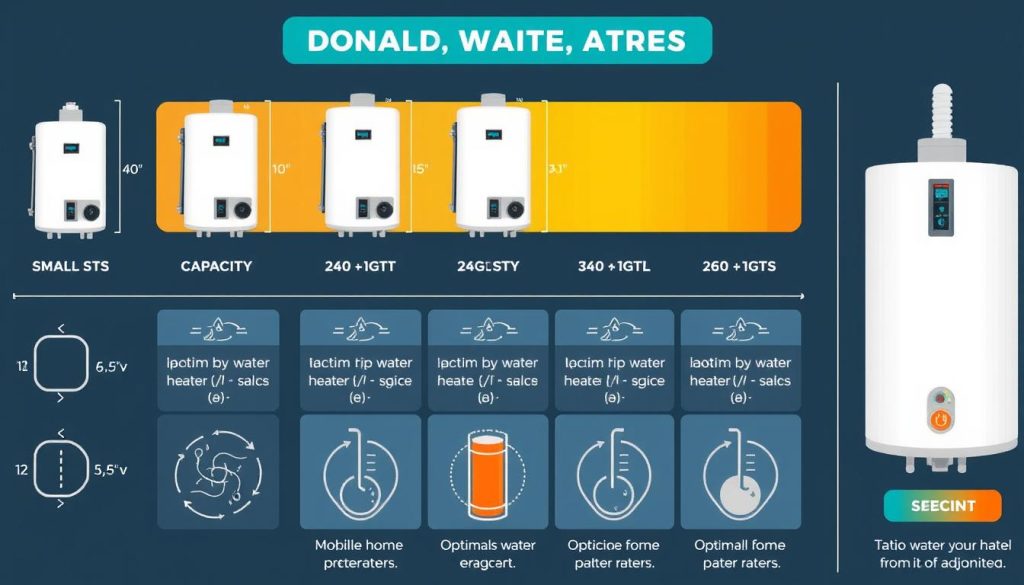
Choosing the right water heater size is key for mobile home owners. The right size means you always have hot water and saves energy. When picking a mobile home hot water heater, several important factors come into play.
Factors Influencing Water Heater Capacity
Finding the perfect water heater size involves several things. How many people live in your home and how much hot water you use daily are big factors. Mobile homes also have limited space, making installation tricky.
- Household size (1-2 people: 30-40 gallons)
- Daily hot water consumption
- Available installation space
- Peak usage times
Understanding Gallon Requirements
Manufacturers suggest different sizes based on your needs. Electric and gas water heaters come in various sizes. A comprehensive water heater buying guide can help you choose the right size.
Pro Tip: Always consider your peak hour demand when selecting a mobile home hot water heater.
For mobile homes, here are some capacity guidelines:
- 1-2 people: 30-40 gallon tank
- 3-4 people: 40-50 gallon tank
- 5+ people: 50-80 gallon tank
Tankless water heaters are another option. They’re rated by flow rate, not tank size. They provide endless hot water and save space. The goal is to match the water heater’s size to your household’s needs.
Installation Process for Mobile Home Hot Water Heaters

Installing a water heater in a mobile home needs careful planning and precision. Mobile home plumbing has special needs for safety and best performance. This guide will help you through the water heater installation steps with confidence.
Before starting, get the right tools and know the safety rules. Mobile homes have unique needs that are different from regular homes.
Essential Tools for Water Heater Installation
- Pipe wrench
- Tubing cutter
- MAPP torch for soldering
- Adjustable pliers
- Teflon tape
- Safety glasses
- Voltage tester (for electric models)
Step-by-Step Installation Guide
- Disconnect power and water supply
- Remove the old water heater carefully
- Clean and prepare the installation area
- Check local mobile home plumbing codes
- Position the new water heater
- Connect water lines securely
- Install temperature and pressure relief valve
*Safety Tip*: Always ensure proper ventilation for gas water heaters to prevent possible fire hazards.
When picking a water heater, think about these key points for mobile homes:
| Consideration | Recommendation |
|---|---|
| Capacity | 40-50 gallons for typical mobile homes |
| Fuel Type | Electric or HUD-certified gas models |
| Ventilation | Meets mobile home specific requirements |
| Space Constraints | Measure allocated installation area |
Pro Tip: Mobile home water heater installation must follow HUD standards. Always check local building codes and the manufacturer’s specs before starting.
Maintenance Tips for Longevity
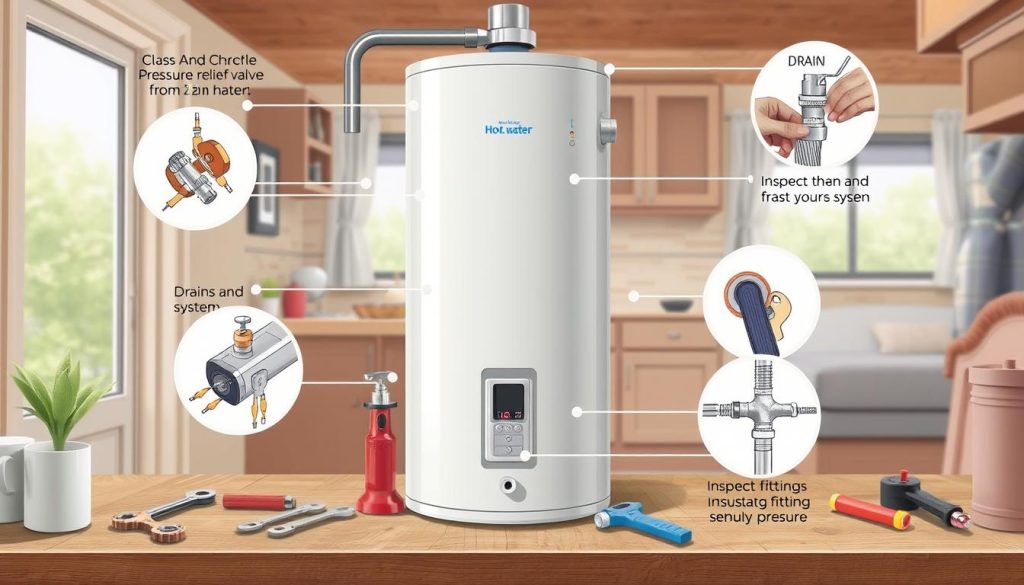
Keeping your mobile home hot water heater in good shape is key. It helps it work well and last longer. Regular care also saves you money and boosts efficiency.
Water heater upkeep includes several important steps. These steps can make your system more reliable and use less energy. With the right care, most water heaters can last ten to fifteen years.
Regular Inspection Schedule
Having a regular maintenance plan is vital for your hot water heater. Here are some key things to check:
- Get annual professional checks
- Look for leaks or rust
- Test the temperature and pressure relief valve
- Check the anode rod every five years
Flushing the Tank
Flushing your tank is a must for water heater care. Sediment buildup can make your system less efficient and even damage it.
| Maintenance Task | Frequency | Estimated Time |
|---|---|---|
| Tank Flushing | Annually | 1-2 hours |
| Anode Rod Replacement | Every 5 years | 30-45 minutes |
| Temperature Setting Check | Bi-annually | 15 minutes |
“Preventative maintenance can save up to 9% on water heating costs and extend your system’s life significantly.”
For electric water heaters, it’s wise to have the heating elements checked by a pro. Regular maintenance can cut energy use by up to 5% and avoid sudden failures.
- Cost of anode rod replacement: $22-$50
- Potential efficiency improvement: Up to 5% per temperature adjustment
- Heat loss reduction through insulation: 25%-45%
Always prioritize safety: shut off power and water supply before performing any maintenance tasks on your mobile home hot water heater.
Upgrading Your Current Hot Water Heater

Manufactured home appliances are key to comfort and efficiency. Knowing when to upgrade your water heater can save money and boost your home’s performance.
Water heaters use a lot of energy, making up about 20% of a home’s energy use. Upgrading at the right time can save a lot of money over time.
Signs It’s Time to Upgrade
- Age of the water heater (typically 8-12 years old)
- Frequent repairs becoming expensive
- Inconsistent hot water supply
- Rising energy bills
- Visible rust or corrosion
Energy Star Ratings: Your Guide to Efficiency
ENERGY STAR certified water heaters are a big step up for energy-efficient water heating. They can be up to 4 times more efficient, using 70% less energy than standard models.
| Efficiency Metric | Standard Model | ENERGY STAR Model |
|---|---|---|
| Annual Energy Savings | Baseline | Up to 70% Less |
| Cost Savings | Standard | ~$550/Year |
| Lifetime Savings | Standard | Over $5,600 |
The cost of an ENERGY STAR water heater usually pays off in three years. Most models come with a 6-year warranty, giving you extra peace of mind.
“Upgrading your water heater is not just about replacing an appliance, but investing in long-term home efficiency and comfort.”
There are also extra incentives to upgrade. Local utility companies offer rebates, and you can get a 30% tax credit, up to $600.
Comparing Electric vs. Propane Water Heaters
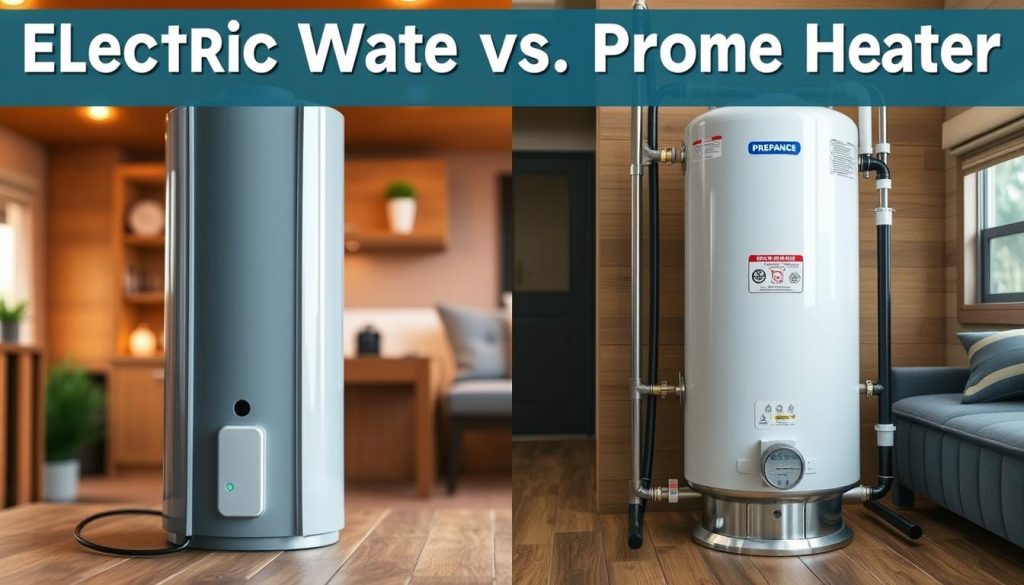
Choosing the right water heater for your mobile home is important. You need to think about electric and propane options. Each has its own benefits and drawbacks that affect your home’s comfort and energy use.
Cost of Operation
The cost of using an electric or propane water heater is a big deal. Recent studies show big differences in yearly costs:
- Electric water heaters cost about $645 a year in a 2,400-square-foot home
- Propane water heaters cost around $290 a year for the same size home
Efficiency Ratings
Efficiency is key when picking a water heater for your mobile home. Here’s how they compare:
| Water Heater Type | Efficiency Rating | Annual Cost Savings |
|---|---|---|
| Electric Water Heater | 90-95% | Standard efficiency |
| Propane Water Heater | 60-85% | Up to 16% on heating costs |
Propane water heaters also have a big environmental advantage. They produce 46% fewer greenhouse gas emissions than electric ones. This, along with lower costs, makes propane a great choice for many mobile home owners.
“The right water heater can save you hundreds of dollars annually while reducing your carbon footprint.” – Energy Efficiency Experts
When deciding between electric and propane, think about local fuel availability, initial costs, and long-term expenses. A 40-gallon propane tank can match a 50-gallon electric tank’s hot water needs. This makes propane more efficient for smaller mobile homes.
Safety Precautions During Installation

Installing a mobile home hot water heater needs careful attention to safety. It’s important to protect both the homeowner and the appliance from risks during water heater installation.
Ventilation Essentials for Gas Water Heaters
Ventilation is key for gas-powered mobile home hot water heaters. Without enough air, carbon monoxide can build up, which is very dangerous.
- Ensure proper clearance around the water heater
- Install dedicated ventilation pipes
- Check for any possible blockages
- Use carbon monoxide detectors near the installation area
Navigating Gas Line Connections
Handling gas lines during installation is very risky. Professional expertise is strongly recommended to ensure safe connections.
- Shut off the main gas supply before starting
- Use approved gas line connection materials
- Apply gas leak detection solution to all connections
- Verify no gas leaks are present
Safety isn’t expensive, it’s priceless – when installing a mobile home hot water heater.
In 1976, HUD set strict standards for manufactured homes. This includes rules for electrical and plumbing systems. Following these rules makes the installation safe and compliant.
Understanding Local Codes and Regulations
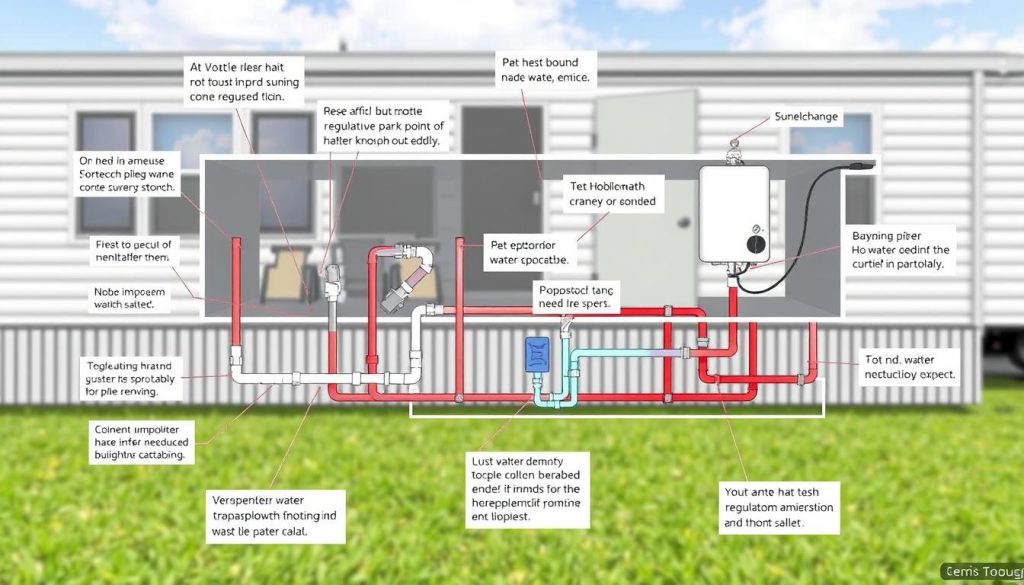
Understanding mobile home plumbing rules is key for safe water heater setup. Local building codes are vital for your home’s safety and workability.
Importance of Compliance in Water Heater Installation
Following local rules is more than a formality—it’s a safety must for mobile home owners. Wrong water heater setup can cause big dangers, like:
- Electrical hazards
- Gas line safety issues
- Potential insurance claim denials
- Substantial fines from local authorities
Finding Local Guidelines for Mobile Home Plumbing
Finding the right local rules needs careful research. Homeowners should look at various sources for a full grasp:
- Local building department
- Municipal code enforcement office
- State-level manufactured housing authorities
- Professional plumbing associations
Different places have their own rules for water heater setup. Important things to think about include:
| Regulation Category | Typical Requirements |
|---|---|
| Electrical Connections | Certified electrician must verify circuit compatibility |
| Seismic Protection | Mandatory tie-down straps in earthquake-prone regions |
| Ventilation | Specific clearance and air intake requirements |
| Permit Requirements | Professional inspection often mandatory |
“Knowing and following local codes isn’t just about compliance—it’s about protecting your home and family.” – Professional Plumbing Association
Getting a pro to install your water heater means you’ll follow all local rules. This reduces safety risks and legal troubles.
Troubleshooting Common Problems
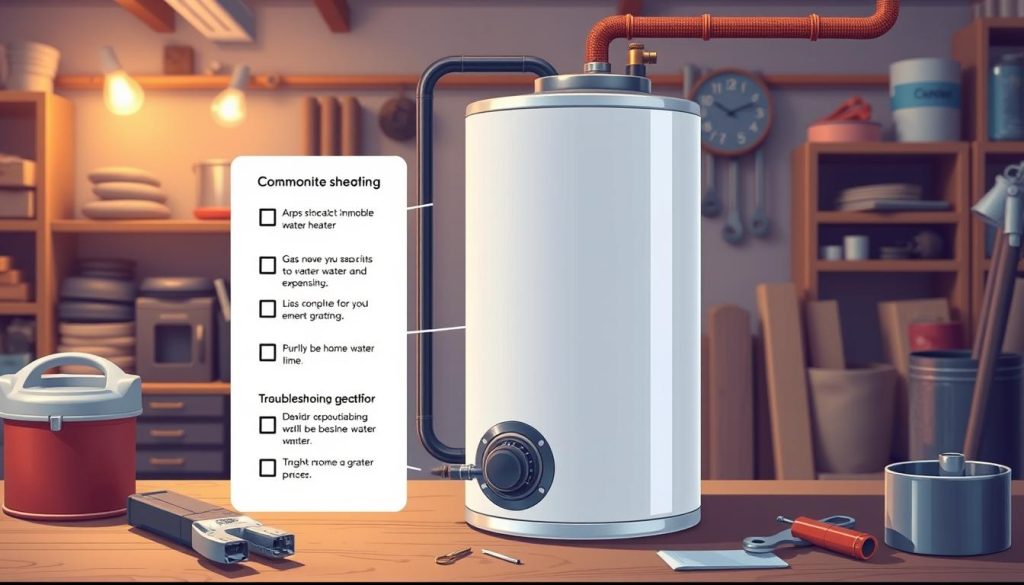
Keeping your water heater in top shape is key for mobile homes. When it breaks down, it can mess up your day and make you unhappy with your hot water heater.
Identifying Causes of Inconsistent Heating
Water that’s not the right temperature can come from a few issues. The main ones are:
- Faulty thermostat settings
- Sediment buildup in the tank
- Failing heating elements
- Incorrect water heater size for your mobile home
Water heaters usually last 8 to 12 years. As they get older, they work less well. Sediment buildup is a big problem in areas with hard water. It makes the heater less efficient and causes temperature changes.
How to Fix Noisy Water Heaters
Strange sounds from your water heater mean it needs some care. Here’s how to figure out what’s wrong:
| Noise Type | Potential Cause | Recommended Action |
|---|---|---|
| Popping/Crackling | Sediment buildup | Flush the tank completely |
| Humming | Loose electrical components | Tighten connections or consult professional |
| High-pitched Whining | Pressure issues | Check pressure relief valve |
“Regular maintenance can prevent 70% of unexpected water heater failures in mobile homes.”
If problems keep coming back, get a pro to check it. They say to keep the water between 120 to 140 degrees Fahrenheit. This helps it work better and avoids damage.
Spotting problems early can save you money and make your water heater last longer.
Eco-Friendly Options for Hot Water Heating
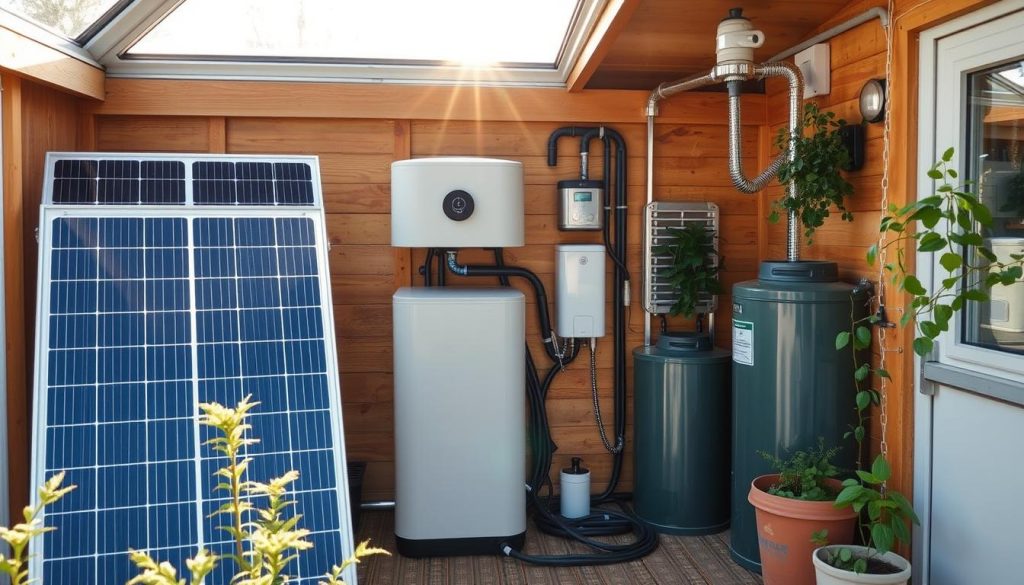
Mobile homeowners are looking for ways to save energy and money. They want to help the planet too. New technologies offer smart, green, and affordable solutions for hot water.
Solar Water Heaters: Harnessing Natural Energy
Solar water heaters are a big step forward in saving energy. They use sunlight to heat water, saving money over time. The benefits are clear:
- Less energy used
- Lower bills every month
- Less harm to the environment
- Maybe get tax breaks
“Solar water heating can provide 50-80% of a home’s hot water needs, dramatically reducing energy expenses.”
Tankless Water Heater Technology
Tankless water heaters are changing the game for mobile homes. They heat water only when needed, saving energy. Here’s why they’re great:
- Always have hot water
- Save up to 20% on energy costs
- Perfect for small spaces
- Last longer than traditional systems
Choosing eco-friendly water heating depends on your needs, where you live, and your budget. Both solar and tankless systems can save a lot of energy and help the planet.
Cost Overview of Hot Water Heater Installation
When planning to install a water heater in your mobile home, think about your budget carefully. The cost can range from $1,561 to $1,812. It might go up to $3,910, depending on what you need. Expect to spend about $2,200 for a full installation that meets your hot water needs.
The type of water heater you choose affects the cost. Electric ones are usually cheaper, at about $1,177. Gas models cost more, around $2,607. The size of the tank also matters, with 30-gallon units for small homes costing $960 to $2,275. For bigger homes, 40-gallon units cost between $1,000 and $2,500.
Choosing the right brand can also impact the price. Brands like Rheem, AO Smith, and Bradford White have different prices. Remember, there are costs beyond just buying the heater. Labor can cost $45 to $200 an hour, and electricians charge $50 to $100 an hour. You might also need to pay for permits, expansion tanks, and warranties, which can add up quickly.
Budgeting for Purchase and Installation
Smart homeowners plan their budget carefully for water heater installation. Look at different brands and models, balancing cost with energy efficiency. Energy Star-rated units might cost more upfront but save money in the long run. Choosing a quality unit can also save you from expensive repairs later.
Hidden Costs to Consider
Unexpected costs can mess up your budget. Think about possible electrical or plumbing changes you might need. Some places offer rebates for energy-efficient models, which can help with costs. Always get quotes from trusted professionals and have a backup fund for any surprises during installation.
